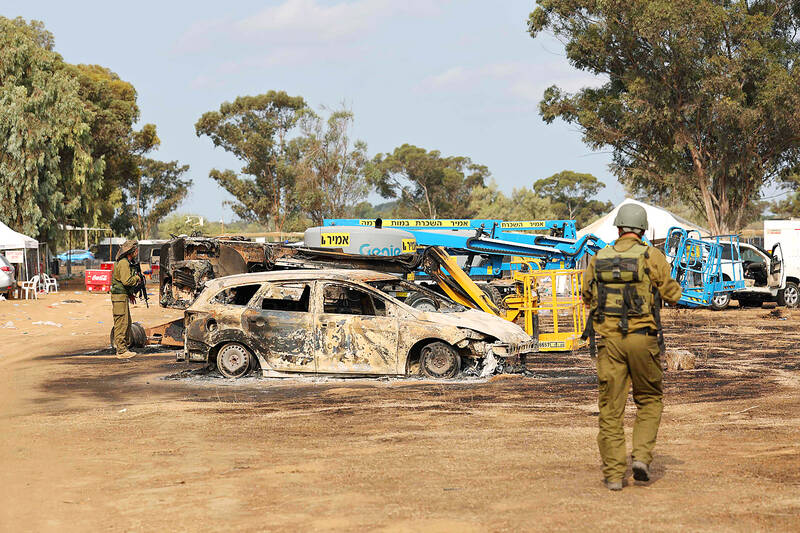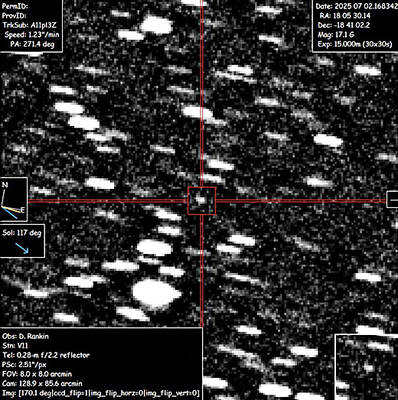As an Israeli volunteer who recovers corpses, Moti Bukjin has worked at horrific disaster sites for decades, but nothing readied him for the carnage Hamas gunmen unleashed on a desert music festival on Saturday.
“It turns out things can be much, much worse,” he said.
He was among the first responders to the site of the massacre at the Supernova festival at a kibbutz near Gaza, where 270 revelers were gunned down or burnt in their vehicles. Most of them were young people in party dress who had danced through the night under the stars.

Photo: AFP
Soon after the sun rose above the Negev Desert on the Jewish Sabbath, survivors recount, rockets started streaking through the sky from nearby Gaza.
The revelers were stunned by what they saw next: Islamist militants with assault rifles racing toward them in trucks, on motorcycles and even flying motorized paragliders.
Spraying gunfire, they “butchered people in cold blood, in an inconceivable way”, Bukjin said, detailing that many victims had been shot in the head at close range.
Describing the aftermath, he said: “They were shot trying to flee and fell into the ditches on the side of the road.”
It was obvious the militants had time to act methodically, Bukjin said.
“They had so much time till the security forces got there. Some of the cars, they burnt with people inside. We saw a gunshot to the head, a bullet to the head, a bullet to the chin,” he said.
It showed the killers were “not randomly spraying bullets and hoping they hit,” he added.
The scale of Saturday’s massive and surprise attack from Gaza has shocked Israel and amounts to the deadliest assault in the nation’s 75-year history.
Under the cover of a barrage of thousands of rockets, the Hamas militants also swarmed into nearby Israeli towns, gunning down civilians. Hamas took at least 100 hostages — including several from the festival — and abducted them back to Gaza, where some were paraded before cheering crowds.
One mother, Ahuva Mayzel, last heard from her 21-year-old daughter, Adi, who was at the festival an hour after sunrise.
“It was our last call, in which we heard a lot of noise, and shootings and bombing — chaos, total chaos,” she told journalists from her home in Karnei Shomron, an Israeli settlement in the occupied West Bank.
Waiting for news of her daughter, Mayzel said “we are just helpless, completely helpless as her parents.”
“Really, this is unimaginable. So many casualties, so many dead, so many missing,” she said.
Aerial footage of the scorched festival site showed the main tent still standing and dozens of vehicles piled up, many charred, in a sign of the panicked rush to speed away.
“There were cars on the side of the road, an overturned car, a car on its side — in each car there were two or three bodies, or just one body shot dead,” Bukjin said.
His religious charity Zaka recovers bodies in accordance with Jewish law and was moving on to other sites in southern Israel.
“It’s going to be a rough day,” he said gravely.
One of the survivors of the festival attack, Ephraim Mordechayev, 23, said he was having “the happiest moment of my life” when the joy turned to horror.
He had just partied through until sunrise “with people I love, [in] a place I love” when he noticed Israel’s aerial defense system intercepting rockets, he said.
At first, “we didn’t comprehend the scope of the event,” he said back in his apartment in the northern city of Or Akiva, still wearing the festival wristband.
Many partygoers were packing up their vehicles and heading for the exit when he heard the first bursts of gunfire.
“I looked back and saw that in the car behind me there were three corpses, and all the car’s windows were shattered,” he said.
As he spotted militants firing from motorized gliders, Mordechayev got out of his car and ran for his life. He hid in bushes for a terrifying wait, until a packed passing vehicle stopped and picked him up before racing off to the safety of a military base.
Mordechayev, who has served more than five years in the army, was stunned at how such a joyful event could turn into the worst nightmare of his life.
“Nobody was armed,” he said. “They came to enjoy the party.”

Two former Chilean ministers are among four candidates competing this weekend for the presidential nomination of the left ahead of November elections dominated by rising levels of violent crime. More than 15 million voters are eligible to choose today between former minister of labor Jeannette Jara, former minister of the interior Carolina Toha and two members of parliament, Gonzalo Winter and Jaime Mulet, to represent the left against a resurgent right. The primary is open to members of the parties within Chilean President Gabriel Boric’s ruling left-wing coalition and other voters who are not affiliated with specific parties. A recent poll by the

TENSIONS HIGH: For more than half a year, students have organized protests around the country, while the Serbian presaident said they are part of a foreign plot About 140,000 protesters rallied in Belgrade, the largest turnout over the past few months, as student-led demonstrations mount pressure on the populist government to call early elections. The rally was one of the largest in more than half a year student-led actions, which began in November last year after the roof of a train station collapsed in the northern city of Novi Sad, killing 16 people — a tragedy widely blamed on entrenched corruption. On Saturday, a sea of protesters filled Belgrade’s largest square and poured into several surrounding streets. The independent protest monitor Archive of Public Gatherings estimated the

Irish-language rap group Kneecap on Saturday gave an impassioned performance for tens of thousands of fans at the Glastonbury Festival despite criticism by British politicians and a terror charge for one of the trio. Liam Og O hAnnaidh, who performs under the stage name Mo Chara, has been charged under the UK’s Terrorism Act with supporting a proscribed organization for allegedly waving a Hezbollah flag at a concert in London in November last year. The rapper, who was charged under the anglicized version of his name, Liam O’Hanna, is on unconditional bail before a further court hearing in August. “Glastonbury,

FLYBY: The object, appears to be traveling more than 60 kilometers per second, meaning it is not bound by the sun’s orbit, astronomers studying 3I/Atlas said Astronomers on Wednesday confirmed the discovery of an interstellar object racing through the solar system — only the third-ever spotted, although scientists suspect many more might slip past unnoticed. The visitor from the stars, designated 3I/Atlas, is likely the largest yet detected, and has been classified as a comet, or cosmic snowball. “It looks kind of fuzzy,” said Peter Veres, an astronomer with the International Astronomical Union’s Minor Planet Center, which was responsible for the official confirmation. “It seems that there is some gas around it, and I think one or two telescopes reported a very short tail.” Originally known as A11pl3Z before